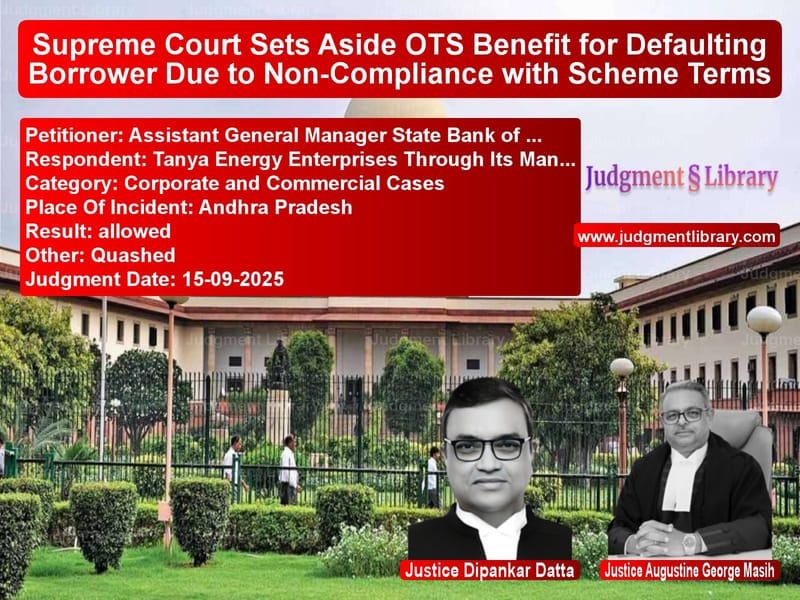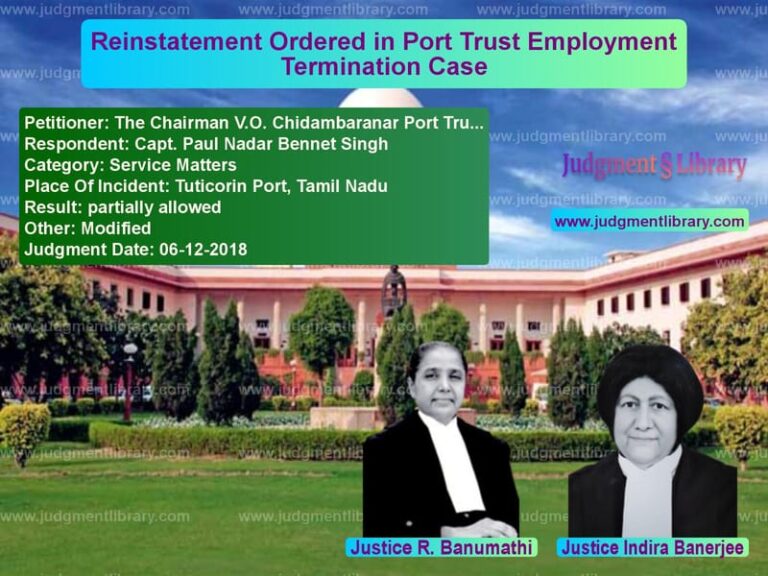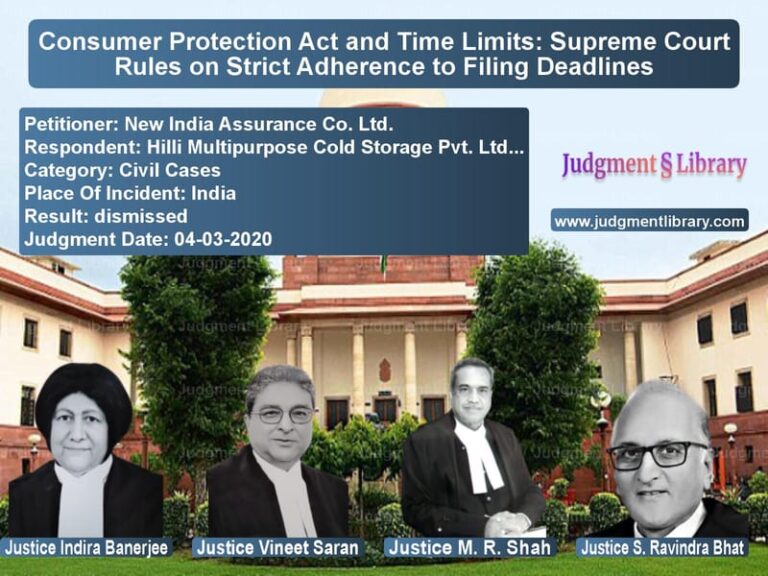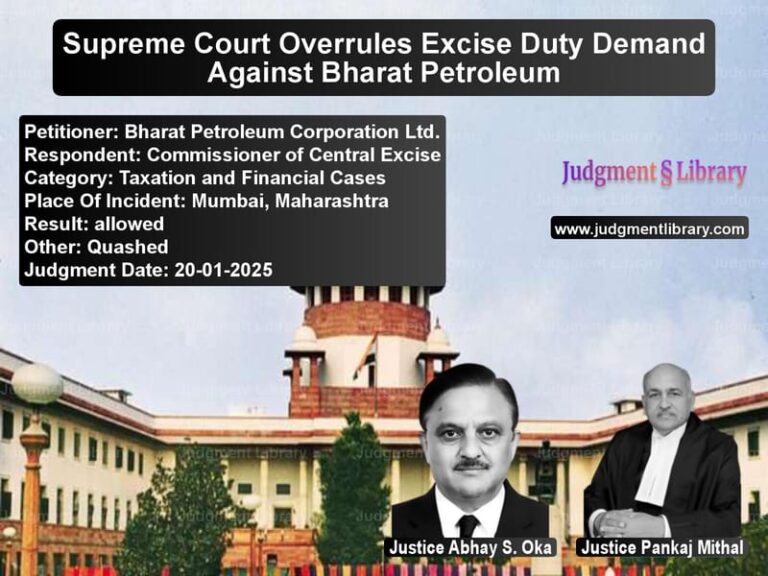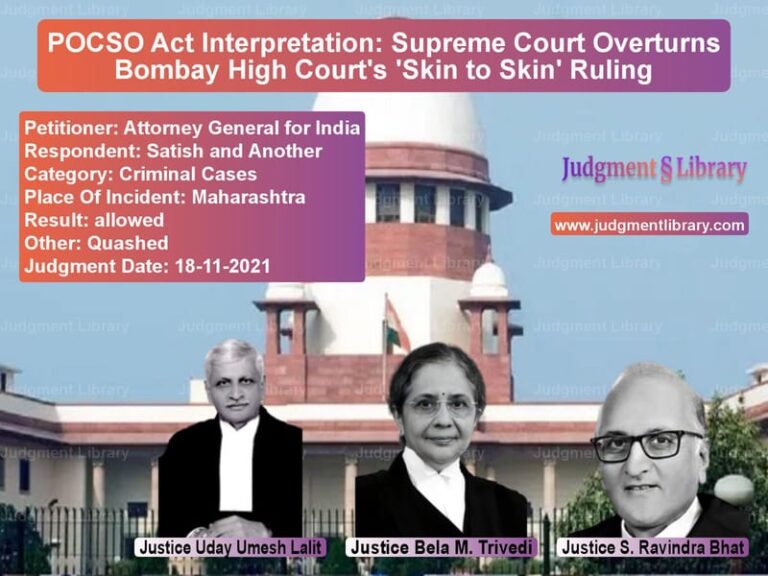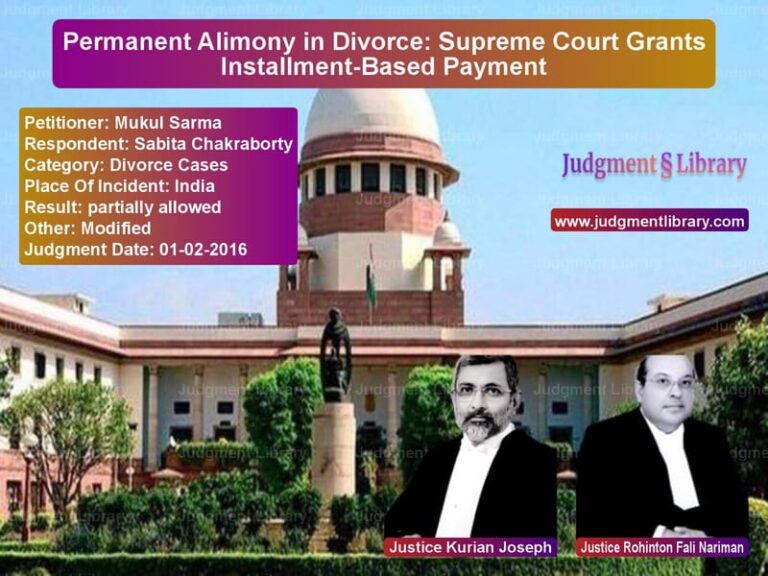Supreme Court Sets Aside OTS Benefit for Defaulting Borrower Due to Non-Compliance with Scheme Terms
In a significant judgment delivered on September 15, 2025, the Supreme Court of India overturned the decisions of the Andhra Pradesh High Court that had directed the State Bank of India to reconsider a borrower’s application under the One Time Settlement (OTS) Scheme 2020. The case, which involved complex legal questions about banking regulations and borrower rights, saw the apex court emphasizing the importance of strict compliance with scheme conditions and the limited scope of judicial intervention in such matters.
The dispute centered around Tanya Energy Enterprises, a borrower who had availed credit facilities from State Bank of India by mortgaging seven immovable properties. When the borrower defaulted on repayment obligations, the account was classified as a non-performing asset, triggering recovery proceedings under the SARFAESI Act. The bank issued a demand notice for approximately Rs. 7 crore in May 2017, and when this remained unpaid, filed an original application before the Debts Recovery Tribunal in December 2017 seeking recovery of around Rs. 8 crore.
The case took an interesting turn when the borrower proposed a settlement of Rs. 5 crore against the total dues of Rs. 8.14 crore in May 2018. The bank accepted this proposal and issued a compromise sanction letter in November 2018 with specific payment schedules. However, the borrower failed to adhere to these terms, leading to cancellation of the settlement in February 2019. Despite making some partial payments, the borrower continued to default, prompting the bank to initiate measures under Section 13(4) of the SARFAESI Act, including issuing sale notices for the mortgaged properties.
The legal battle intensified when State Bank of India introduced the OTS 2020 Scheme in October 2020 for settlement of outstanding dues between Rs. 20 lakh and Rs. 50 crore. The borrower immediately applied under this scheme but the bank rejected the application in November 2020, citing the borrower’s previous conduct of failing to comply with DRT orders and suppression of facts.
During the Supreme Court proceedings, the arguments presented by both sides revealed contrasting perspectives on banking regulations and borrower rights. The Additional Solicitor General representing the bank contended that “the OTS 2020 Scheme cannot be enforced under Article 226 of the Constitution unless all terms and conditions are satisfied. According to him, a public duty must be shown to exist before a mandamus could issue directing a public authority to discharge such duty. Here, there was no such public duty which the appellants failed to discharge having noted the conduct of the respondent in failing to clear his debt despite having been granted sufficient opportunities.”
He further emphasized that “the conduct of the party invoking the writ jurisdiction of a high court under Article 226 is relevant, Mr. Venkatraman submitted that here is a litigant who not only does not honour his commitments but also has scant respect for orders passed by the DRT.”
On the other side, the borrower’s senior counsel Mr. D.S. Naidu argued that “the decision to accept or reject an OTS proposal must be reasoned, based on scheme eligibility, and in compliance with the principles of natural justice.” He contended that “neither the writ court nor the appellate court directed a positive grant of OTS; what the court required was a consideration of the respondent’s application under the OTS 2020 Scheme. Rejection of the respondent’s application without due consideration or opportunity of hearing is wholly arbitrary, given the fact that the respondent had already deposited about Rs.1.5 crore (inclusive of Rs. 0.50 crore pursuant to an earlier failed compromise) in good faith.”
The Supreme Court, in its detailed analysis, focused on a crucial aspect that both the High Court and the parties had overlooked – Clause 4(i) of the OTS 2020 Scheme. This clause mandated that “the borrower has to deposit 5% or 15%(for wilful defaulters) of the OTS Amount at the time of submission of application to indicate his willingness for OTS, failing which the application will not be processed.”
The Court noted with significance that “We did not find the respondent, while applying for the benefit of the OTS 2020 Scheme, to have deposited a single paisa towards up-front payment. In terms of clause 4(i) of the OTS 2020 Scheme, any application received without up-front payment is not required to be processed even. Thus, in the first place, the respondent’s application was incomplete and it did not have any right in law to claim that such application should be processed.”
This observation became the cornerstone of the Supreme Court’s decision. The bench comprising Justice Dipankar Datta and Justice Augustine George Masih held that “It is clear as a sunny day that an application for availing the benefit thereunder would be processed if such application were accompanied by an up-front payment of 5% of the outstanding dues. Indubitably, the respondent faltered in not adhering to the express terms of such scheme by not depositing 5% of the outstanding dues as up-front payment, thereby rendering its application disentitled to be processed even, far less deserving a favourable consideration.”
The Court addressed an important legal question about whether it could consider grounds not mentioned in the original rejection order. Referring to established precedents including Mohinder Singh Gill vs. Chief Election Commissioner, the Court developed a nuanced position: “While the courts, in course of reviewing administrative orders, may not permit additional grounds not found within the four corners of the said order to be raised in an affidavit or in oral arguments, we are inclined to the view that the factual narrative in such order and the documents referred to therein can certainly be considered together with the case set up in the writ petition, but in appropriate cases. Such cases could include a case, as the present, where the mentioned grounds are found to be untenable and, thus, unsustainable, but an alternative ground is traceable which could have validly been mentioned as a ground to support the impugned rejection had there been a proper application of mind by the administrative authority.”
The judgment made an important distinction about OTS eligibility, noting that “No doubt, clause 2.1 of the OTS 2020 Scheme laying down cases which are ‘not eligible’ had no application qua the respondent but overcoming the ‘not eligible’ criteria did not amount to satisfying the other eligibility criteria. Not being covered by clause 2.1 does not necessarily lead to the conclusion that a defaulting borrower is automatically entitled to have the loan account settled on the basis of the OTS 2020 Scheme. Crossing the hurdle of eligibility per se would not entitle a defaulting borrower to claim consideration of his/its application unless the application itself satisfies the other stipulated conditions.”
In its concluding remarks, the Supreme Court observed that “From whichever angle one looks at the issue, the conclusion is irresistible that the respondent’s conduct disabled itself to have a fair and objection consideration of its application for OTS.”
The Court allowed the bank’s appeal while giving the borrower an opportunity to “submit a fresh proposal for OTS but not under the OTS 2020 Scheme. If the terms and conditions put forth by the respondent are found reasonable, workable and acceptable, the appellants may take such decision on it as deemed fit and proper in the circumstances.”
This judgment reinforces several key principles in banking and recovery law. It emphasizes that OTS schemes are contractual in nature and require strict compliance with all conditions. It clarifies that judicial intervention in such matters is limited and courts cannot direct banks to grant OTS benefits when borrowers fail to meet essential conditions. The decision also establishes that while eligibility under exclusion clauses is important, it doesn’t automatically entitle borrowers to settlement benefits if they fail to comply with other mandatory requirements.
The Supreme Court’s approach in this case demonstrates a balanced consideration of both banking sector requirements and borrower rights, while maintaining that scheme conditions must be strictly followed for any legitimate claim to arise. The judgment serves as an important precedent for future cases involving OTS schemes and banking recoveries, clarifying the legal position on several contentious issues that frequently arise in such disputes.
Petitioner Name: Assistant General Manager State Bank of India & Anr..Respondent Name: Tanya Energy Enterprises Through Its Managing Partner Shri Alluri Lakshmi Narasimha Varma.Judgment By: Justice Dipankar Datta, Justice Augustine George Masih.Place Of Incident: Andhra Pradesh.Judgment Date: 15-09-2025.Result: allowed.
Don’t miss out on the full details! Download the complete judgment in PDF format below and gain valuable insights instantly!
Download Judgment: assistant-general-ma-vs-tanya-energy-enterpr-supreme-court-of-india-judgment-dated-15-09-2025.pdf
Directly Download Judgment: Directly download this Judgment
See all petitions in Debt Recovery
See all petitions in Contract Disputes
See all petitions in Banking Regulations
See all petitions in Corporate Compliance
See all petitions in unfair trade practices
See all petitions in Judgment by Dipankar Datta
See all petitions in Judgment by Augustine George Masih
See all petitions in allowed
See all petitions in Quashed
See all petitions in supreme court of India judgments September 2025
See all petitions in 2025 judgments
See all posts in Corporate and Commercial Cases Category
See all allowed petitions in Corporate and Commercial Cases Category
See all Dismissed petitions in Corporate and Commercial Cases Category
See all partially allowed petitions in Corporate and Commercial Cases Category

